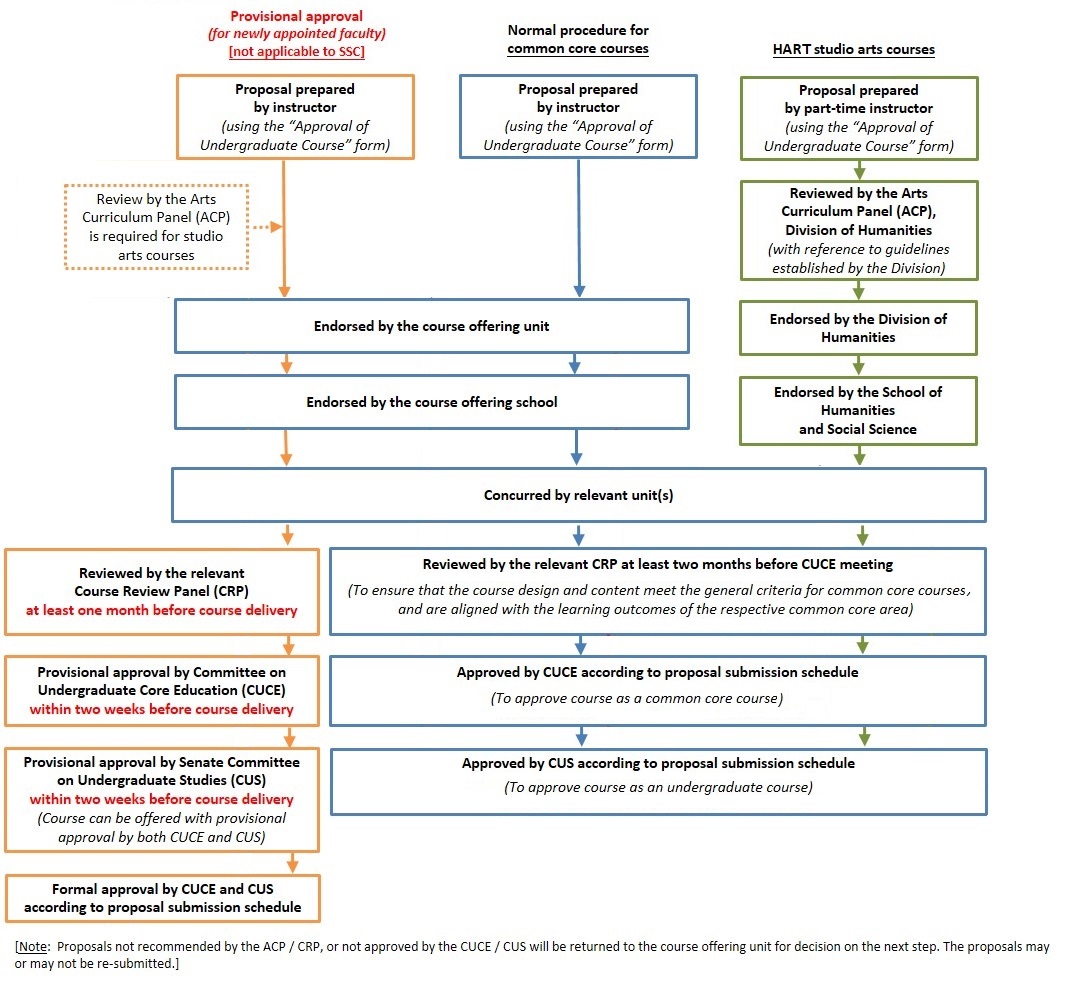New Common Core Courses Approval Process
Proposals for new common core courses should be submitted using the prescribed form "Approval of Undergraduate Course". The new course proposal is subject to an elaborated process of approval, which applies to all common core course proposals, regardless of what the course offering unit is, or which common core area they are listed under. The course approval process is shown below.

The course offering school submits the new course proposal to Undergraduate Core Education (UCE) Team, Academy of Interdisciplinary Studies, after it is endorsed by the course offering school and concurrences from all schools are cleared.
Evaluation of Course Proposal and Approval Process
To assure that courses developed are achieving the goals of the Program, the course proposal will be evaluated by:
Course Curriculum
The outcome-based education (OBE) approach is adopted in the design of course curriculum. The course learning outcomes are aligned with the intended learning outcomes (ILOs) of the common core area and achieved through a coherent and effective course content and structure.
- The course learning outcomes are clearly stated with OBE approach
- The course learning outcomes are aligned with the common core area ILOs
- The course content and structure are coherent and effective in enabling students to attain the course learning outcomes
- The course topics are arranged in a sequence that facilitate students to attain the course learning outcomes
Contribution to Common Core Program
The course contributes to the objectives of the Common Core Program in complementing studies in specialist disciplines and providing a whole-person learning and developmental experience for students.
- The course enhances students’ competencies, including communication, personal development , problem solving, and social responsibility
- The course nurtures students’ ability to integrate knowledge of different studies
- The course encourages students to pursue knowledge in a self-motivated manner
- The course challenges students to consider social, cultural, or philosophical issues
Teaching and Learning
The teaching and learning (T&L) activities are effective in delivering the course learning outcomes and course content; content; and are appropriate to facilitate the exploration and development of competencies.
- Students without any prior background or only with an academic background comparable to high school graduate level are able to participate in the learning activities
- The T&L activities are effective in delivering the course content and facilitate students in attaining the course learning outcomes
- The T&L activities allow students to practice and apply the competencies multiple times to scaffold their learning
- The T&L activities demonstrate the potential to deepen students’ understanding of the course content and the competencies
- The T&L activities are student-centered which engages students in the learning process
- The T&L activities are conducive to effective interaction between instructor and students
- If the medium of instruction is not English, sound justification is provided to show that it is appropriate and can facilitate teaching and learning, unless approval has been obtained for the current Common Core course
Assessment
Assessment methods are appropriate to enable and evaluate students’ achievement of the course learning outcomes; and are appropriate to facilitate the exploration and development of competencies.
- The assessment tasks allow students to demonstrate their attainment of the course learning outcomes
- The assessment tasks are effective in supporting students to develop competencies
<Block size to be be expanded by vendor to fit the contents>
All course proposals will be reviewed by the relevant Course Review Panel (CRP). Courses proposed to be listed under more than one common core area will be reviewed by all relevant CRPs concerned. The role of a CRP is to ensure that the course design and content meet the general criteria for common core courses and are aligned with the stated intended learning outcomes. Comments or suggestions from the CRP for clarifying or making improvements, if any, will be communicated to the course offering school for consideration of revising the proposal. The CRP will provide a final recommendation for each proposal for consideration of approval by the Committee on Undergraduate Core Education (CUCE).
The authority of CUCE is to approve a proposed new course as a common core course. A new common core course can be added to the common core course list and be offered only when it is also approved by the Senate Committee on Undergraduate Studies (CUS) as an undergraduate course.
Proposals not recommended by the CRP, or not approved by CUCE or CUS, will be returned to the course offering unit for consideration of the next step. The proposals may or may not be re-submitted.
In view of the elaborated approval process for common core courses which normally takes about two months to complete, the course offering school may request for provisional approval for new common core courses that are to be developed by newly appointed faculty.
The course offering school will submit a course proposal for vetting by the CRP at least one month prior to the delivery of the course. It should be accompanied by a request to seek provisional approval and a brief explanation of the reason for making the request. The submission may take place while the instructor's formal appointment is being processed.
The proposal needs to be at the level of details equivalent to what are expected of a regular new course proposal. The School is encouraged to have supporting staff facilitating the write up of this proposal.
The CRP (at least two members) will give an evaluation of the proposal, provide comments (if there is any), and make a provisional approval (subject to the final submission of amendment at least two weeks before the delivery date).
CUCE and CUS approval will be sought at a regular meeting or by circulation within two weeks prior to the delivery date.
The course is allowed to be offered based on the provisional approval given by CUCE and CUS. Formal approval by CUCE and CUS will be sought as soon as possible after this provisional approval has been granted.
It is expected that only a small number of courses will be reviewed under this vetting protocol. After this process has been run through in a reasonable number of cases, a review of this mechanism will be conducted to ensure that the academic rigor of courses has not been compromised by this alternative fast track process.
